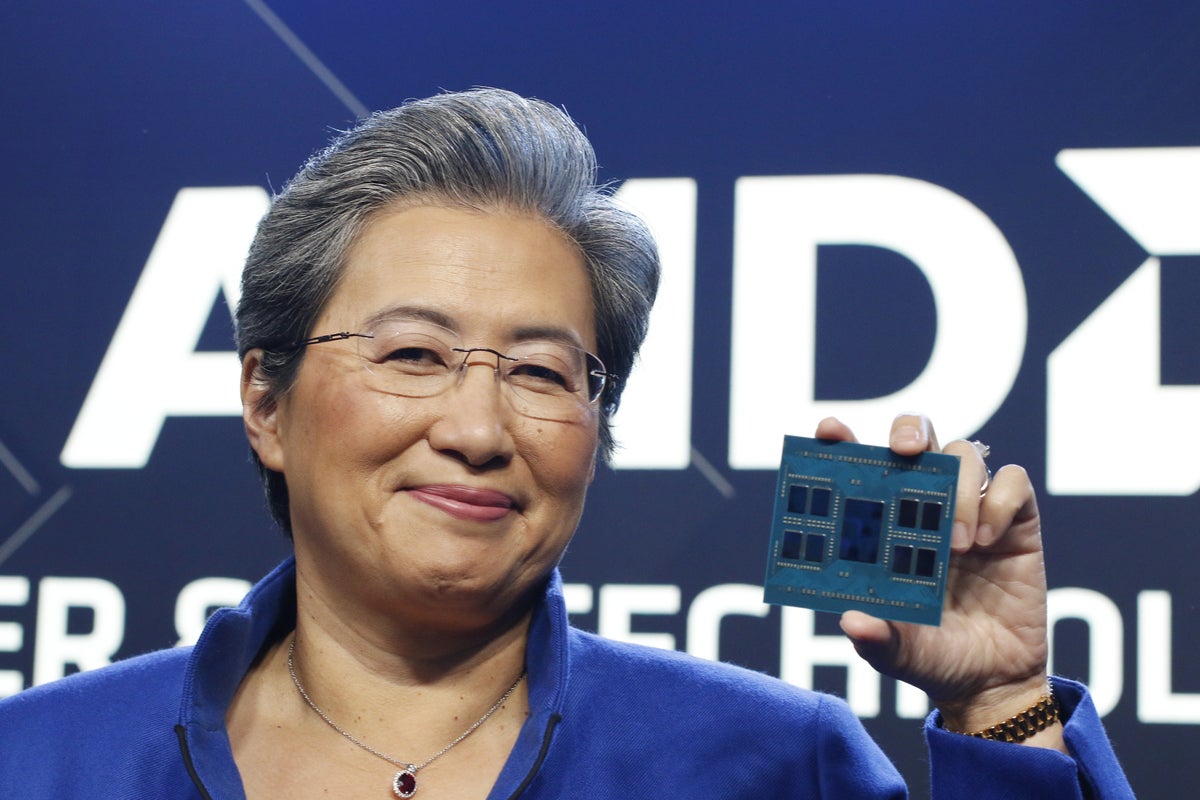AMD unveils AI processor, looks to challenge Nvidia

AMD is coming for Nvidia’s AI crown in a big way with the launch of its new Instinct processor, which it claims can do the work of multiple GPUs.
CEO Lisa Su called the Instinct MI300X “the most complex thing we’ve ever built.” She held up the chip, which is about the size of a drink coaster, at an event on Tuesday in San Francisco.
Weighing in at 146 billion transistors, the MI300X comes with up to 192GB of high-bandwidth HBM3 memory shared by both the CPU and GPU. It has a total of 13 chiplets on the die. The chip also has a memory bandwidth of 5.2 TB/s, which is 60% faster than Nvidia’s H100.
The chip consists of Zen CPU cores and AMD’s next-generation CDNA 3 GPU architecture. The enormous amount of memory is the real selling point, according to Su.
“If you look at the industry today, you often see that, first of all, the model sizes are getting much larger. And you actually need multiple GPUs to run the latest large language models,” she said. “With MI300X, you can reduce the number of GPUs for this, and as model sizes continue growing, this will become even more important. So with more memory, more memory bandwidth, and fewer GPUs needed.”
AMD says the design of the MI300X makes it eight times more powerful than the existing MI250X used in Frontier (the world’s fastest supercomputer) and five times more energy efficient. It will be used in the two-plus exaFLOP El Capitan system that will be built next year at Lawrence Livermore National Labs.
As part of the announcement, Su also unveiled the AMD Instinct platform, a server reference design based on specifications from the Open Compute Project that uses eight MI300X GPUs for generative AI training and inference workloads.
This means enterprises and hyperscalers can use the Instinct Platform to put MI300X GPUs in existing OCP server racks.
“We’re actually accelerating customers’ time to market and reducing overall development costs, while making it really easy to deploy the MI300X into their existing AI ramp and server construction,” Su said.
New cloud CPU
In other news, AMD discussed its fourth-gen EPYC 97X4 processor, code-named Bergamo. This processor is specifically designed for cloud environments in that it has many cores for virtual machines to run. Bergamo comes with 128 cores with hyperthreading, so a dual-socket system can have up to 512 virtual CPUs.
Su talked about how cloud-native workloads are “born in the cloud.” They’re designed to take full advantage of new cloud computing frameworks, and they essentially run as microservices. The design of these processors is different from general purpose computing – Bergamo processors are smaller and very throughput-oriented, hence the many core design.
“Bergamo leverages all of the platform infrastructure that we already developed for Genoa. And it supports the same next gen memory and the same IO capabilities. But it allows us with this design point to expand to 128 cores per socket for leadership performance and energy efficiency in the cloud,” said Su.
Both the MI300X and Bergamo will begin sampling in the third quarter.
Next read this:
